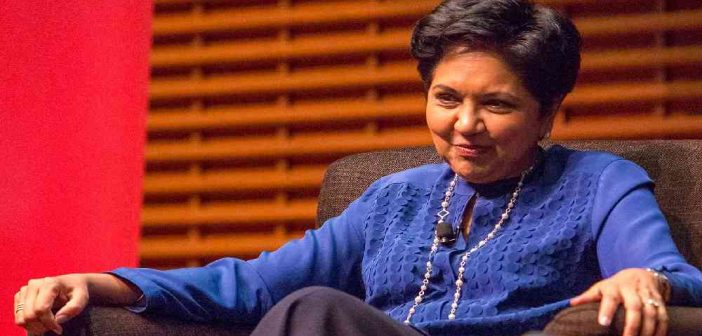Stepping into the CEO’s shoes at PepsiCo, one of the world’s largest food and beverage companies, and turn it around within a short span of time is no easy task. But that’s exactly what Indra Nooyi did on joining the company way back in 2006.
The company’s global revenue has gone up from $40 billion in 2007 to more than $63 billion in 2015. A tough-minded willingness to uproot a legacy culture and focus on the customer experience are said to be the reason behind Nooyi’s success.
Nooyi, in an interview with Walmart CEO Doug McMillon at the ‘View from the Top’ session at Stanford Graduate School of Business recently, says she disagrees with management theorists who advocate ignoring short-term results in favour of long term ones.
“You’ve got to look at the investments you make in the company as a portfolio. There’s a bunch of stuff that delivers in the short term. That gives you the breathing room and the fodder to invest in the long term,” she points out.
Investors would also not tolerate a manager who wants them to wait three to five years for huge results.
Nooyi feels that conventional business thinking that a turnaround has to be made while preserving the company’s culture and history may not work in most cases. It may, in fact, turn out to be a drag during a revamp.
Being too respectful of the company’s past would lead to appeasing appeasing conservative, long-tenured employees, rather than telling them about the need to make changes that could be painful too, she says.
“I think if I had to do it all over again, I might have hastened the pace of change even more,” she adds.
Nooyi says she follows the advice given by Steve Jobs, co-founder, chairman, and chief executive officer (CEO) of Apple Inc., about not being “too nice”.
Jobs told her that when you really don’t get what you want and you really believe that’s the right thing for the company, it’s OK to throw a temper tantrum. Nooyi terms it “a valuable lesson.”
On some of the CEOs facing flak for controversial personal statements, she says one has to be careful about putting out personal messages.
However, personal conservatism versus taking risks with the business are two different issues. “If you really want advantage, you’ve got to be the first mover. So I think on the product side and the product experience side, we can take as many risks as we want,” she says.
Nooyi believes managers who depend upon the traditional planning cycle or the standard set of consulting reports are doing their companies a disservice. “Our CEOs and leaders have to be lifelong students—not just students in the sense of attending courses or reading a book or two. You’ve got to learn how to read widely, walk the market, look at trends in the marketplace, make connections that don’t seem obvious,” she adds. (Image Courtesy : www.gsb.stanford.edu)




